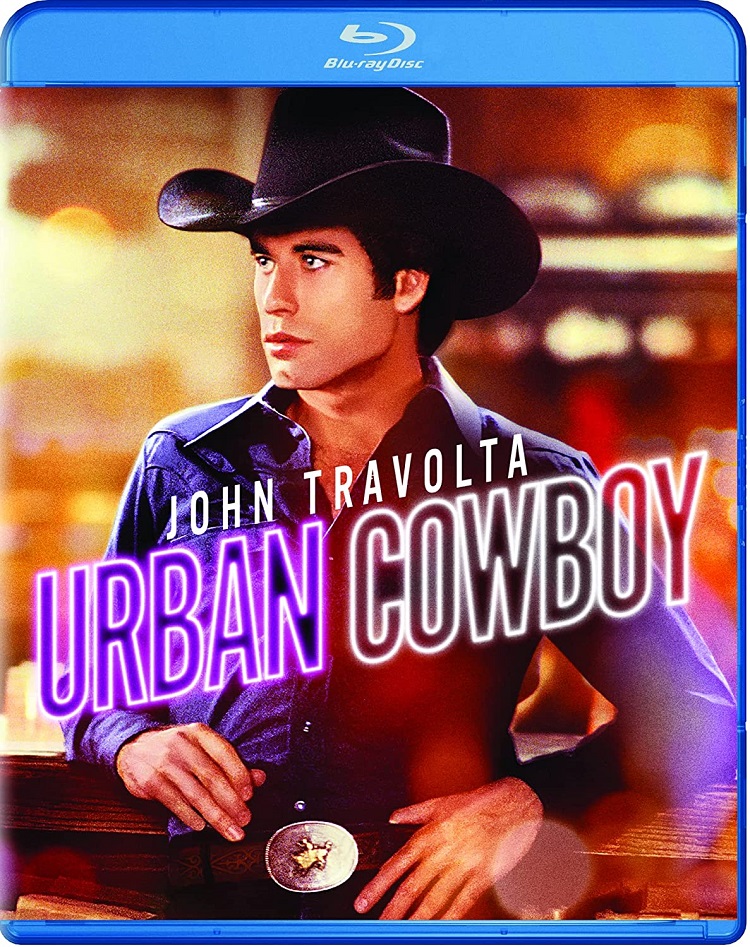
Urban Cowboy (1980) is one of those faddish films that has aged poorly.
John Travolta plays Bud Davis, a country boy from Spur, Texas, who goes to Houston to work in an oil refinery. After hours, he frequents Gilley’s, a honkey-tonk the size of a football field, with a dance floor and mechanical bull. Bud’s day job is just a means to his nightlife. At Gilley’s, he gets his girl, Sissy (Debra Winger, in her breakout performance), loses her to an ex-convict stud in a mesh shirt, Wes (Scott Glenn), and fights to win her back.
Love and strife among the beer-soaked mechanical bull-riders, in other words.
From the start, we are at a deficit. Granted, Travolta, as foxy as ever, looks like a star. As he did in Saturday Night Fever and Pulp Fiction, he moves with a kind of grace, a dancer’s poise. Those films—especially the Brian De Palma collaborations (Carrie, Blow Out)—gave him a chance to show his range. In at least three of them, he played a likeable hero with layers of character. In Urban Cowboy, screenwriter-director James Bridges conceives Bud thinly. He’s not believable. The few moments we catch him smiling and having fun, we hope the movie will too. That doesn’t pan out, though. 99.9 percent of the time, he’s a petulant boor; and though Travolta commands the screen, he is miscast.
As a fluff vehicle for its lead, Urban Cowboy is dull and drab; but as a showcase for the charming Debra Winger (dig the way she rides that bull!), it suggests a better film. Bridges could have made her the focal point and, in so doing, could have done something odd and fresh. Instead, Sissy (like Wes) is a tool for Bud’s comeuppance. Initially, she seems like more than just a girl to whom things merely happen. She upends Bud’s ideas of what a wife should be. Skilled at riding the bull, she won’t cave to his outmoded notions about manliness. As for Wes, he, too, rages against the wooden way Bridges would present him. And Glenn kills in the part. He’s taut; he radiates a lean, ill will. But soon the plot cranks into action and the characters become cogs, bringing the film to a pat finish.
Had Bridges cared less about formula and trained a more curious eye on his subject, the characters might have been free to be as complex and interesting (as winningly real) as the actors try to make them. But he downgrades the entire effort. He turns them into clods. They’re hot bumpkins, no more and no less, put on display to cash in on the pop country & western craze of the late ‘70s and early ‘80s.
Based on an Esquire article that tried to do for country & western bars in Houston what Saturday Night Fever did for New York discos, Urban Cowboy pales by comparison. It can’t touch the other film’s memorable moments. The unimaginative characterizations aside, Cowboy suffers from a forgettable soundtrack. The music roots us, but it never catches fire. In Saturday Night Fever, the music and the dancing consumed the characters. (It also helps that the best numbers were a musical peak for a previously passe boy band [yes, I mean the Bee Gees]). In Urban Cowboy, the soundtrack is wallpaper, a backdrop with no galvanic force of its own. Germane to the subculture of the film, it doesn’t comment on the story or the characters’ motivations the way Fever or the country tunes in Robert Altman’s Nashville did. It doesn’t spark in a meaningful way, which could be the film’s point.
Urban Cowboy clocks in at a soul-destroying 134 minutes. It should be faster, less tame. It should have done more to embrace its trashy, achy-breaky heart. (I have a similar problem with American Gigolo, another Paramount picture from the same era that danced around pulp. The studio had offered that part to Travolta as well!). The love affairs, the reckless abandon with which the urban cowboys at Gilley’s guzzle beer and ride mechanical bulls, should excite us more; should leave us more than casually amused. But the movie is limp—a document of a time and place gussied up for a PG rating. Without a fascinating hero or soundtrack to anchor it, you wonder:
For an unattractive slice of life this boring, who cares?
The Paramount Blu-ray released on June 2, 2020, celebrates the film’s 40th anniversary. The disc has a retrospective interview with the real-life Gilley, along with deleted scenes, outtakes, and rehearsal footage. Gilley seems like a nice guy. Someday, his fondness for Urban Cowboy and the lasting influence it had on his life might convince me to go softer on it. This is not that day, or year.